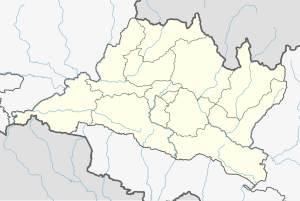Nagarjun is a municipality in Kathmandu District in Bagmati Province of Nepal. It was formed on 2 December 2014 by merging the former VDCs of Bhimdhunga, Ichangu Narayan, Ramkot, Syuchatar and Sitapaila.[1][2] The office of the municipality is located at Harisiddhi, Sitapaila. There are ten wards in the municipality.
Nagarjun Municipality
नागार्जुन नगरपालिका | |
|---|---|
 Nagarjun municipality with Tarakeshwar and Budhanilkantha in background. | |
| Coordinates: 27°43′57″N 85°15′24″E / 27.73250°N 85.25667°E | |
| Country | |
| Province | Bagmati |
| District | Kathmandu |
| Established | December 2014 |
| Government | |
| • Mayor | Mohan Basnet (NC) |
| • Deputy Mayor | Sushila Adhikari (NCP) |
| Area | |
| • Total | 29.8 km2 (11.5 sq mi) |
| Population | |
| • Total | 115,437 |
| • Density | 3,900/km2 (10,000/sq mi) |
| • Ethnicities | |
| Time zone | UTC+5:45 (Nepal Time) |
| Website | www |
Geography
editIt is surrounded by 13,14, 15 and 16 number wards of Kathmandu Metropolitan City on the east, Dhading District on the west, Tarkeshwar Municipality on the north and Chandragiri Municipality on the south. The area of the municipality is 29.8 square kilometres (11.5 sq mi) and the average altitude is 1,300 metres (4,300 ft) to 2,500 metres (8,200 ft) above sea level.[3]
Demographics
editAt the time of the 2011 Nepal census, Nagarjun Municipality had a population of 68,863. Of these, 71.1% spoke Nepali, 11.3% Newar, 8.9% Tamang, 2.0% Gurung, 1.4% Magar, 1.3% Maithili, 0.6% Rai, 0.6% Sherpa, 0.6% Tharu, 0.5% Bhojpuri, 0.4% Hindi, 0.2% Limbu, 0.2% Tibetan, 0.1% Doteli, 0.1% Kham, 0.1% Thakali, 0.1% Urdu and 0.2% other languages as their first language.[4]
In terms of ethnicity/caste, 23.6% were Chhetri, 22.0% Hill Brahmin, 17.5% Newar, 13.6% Tamang, 4.8% Magar, 3.9% Sanyasi/Dasnami, 3.3% Gurung, 1.6% Thakuri, 1.4% Rai, 1.1% Tharu, 0.8% Kami, 0.8% Musalman, 0.7% other Dalit, 0.6% Sherpa, 0.5% Damai/Dholi, 0.4% Limbu, 0.3% Gharti/Bhujel, 0.3% Thakali, 0.2% Badi, 0.2% Ghale, 0.2% Majhi, 0.2% Sarki, 0.2% Yadav, 0.1% Bhote, 0.1% Terai Brahmin, 0.1% Dhanuk, 0.1% Dura, 0.1% Hajjam/Thakur, 0.1% Halwai, 0.1% Kalwar, 0.1% Koiri/Kushwaha, 0.1% Kumal, 0.1% Marwadi, 0.1% Sunuwar, 0.1% Teli, 0.1% other Terai and 0.2% others.[5]
In terms of religion, 82.3% were Hindu, 14.1% Buddhist, 2.4% Christian, 0.8% Muslim, 0.3% Kirati and 0.1% others.[6]
In terms of literacy, 85.1% could read and write, 1.7% could only read and 13.1% could neither read nor write.[7]
The population of the municipality grew to 115,437 at the 2021 Nepal census. Around 99.4% of the residents were Nepali citizens and 89.2% were literate in 2021.[8]
Popular sites
edit-
Amitabha Monastery, Ramkot
-
Aadeswor Mahadev Temple, a Shiva Temple in Sitapaila
-
Statues inside Amitabha Monastery, Ramkot
- Ichangu Narayan Temple
- Amitabha Monastery
- Aadeswor Mahadev Temple
- Halchowk Akash Bhairav
- Tarkeshwar Temple
- Badri Narayan Dham
- Sahid Park
- Switzerland Park
- Panch Kanya Temple
- Bhuwaneswori Temple
References
edit- ^ "Govt announces 61 municipalities". The Kathmandu Post. 3 December 2014. Retrieved 2 December 2014.[permanent dead link]
- ^ "Govt creates 61 new municipalities". República. 3 Dec 2014. Retrieved 2 Dec 2014.
- ^ "Municipal profiles". 2014-01-07. Archived from the original on 2014-01-07. Retrieved 2022-10-31.
- ^ NepalMap Language [1]
- ^ NepalMap Caste [2]
- ^ NepalMap Religion [3]
- ^ NepalMap Literacy [4]
- ^ "Nagarjun (Municipality, Nepal) - Population Statistics, Charts, Map and Location". www.citypopulation.de. Retrieved 2024-02-09.

